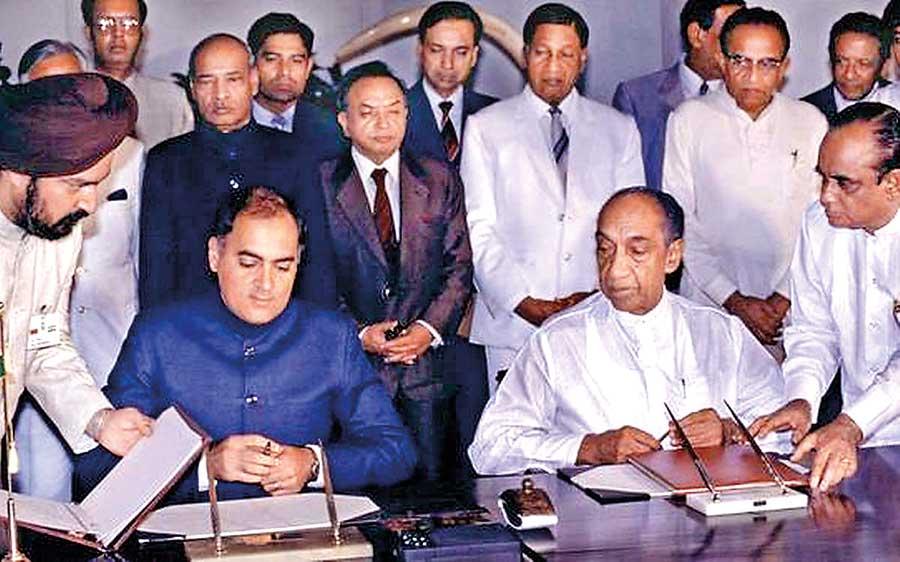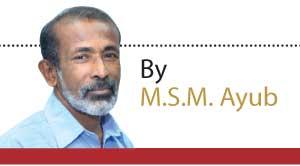Reply To:
Name - Reply Comment

- Efforts were made by the officials of the Indian foreign office such as Gopalaswamy Parthasarathy and Romesh Bandari to convince the Sri Lankan leaders to accept the concept of devolution amidst violence unleashed by the Tamil armed groups who were armed, financed and trained by the Indian authorities
- Only President Gotabaya Rajapaksa has rejected Indian leaders’ suggestion to implement the 13th Amendment fully, though not to their face but during discussions with Indian media, in November last year
- Tamil leaders and Sinhalese leaders have their own reasons to support and reject the concept of devolution of power as a solution to the ideological conflicts between the two communities
The rhetoric against the 13th Amendment to the Constitution and the resultant Provincial Councils by the Government ministers’ seems to be waning away. The reason or reasons for the calls for the abolition of the Constitutional amendment by ministers and various Sinhalese nationalist groups not being heard for about two weeks is not clear. 
Also the government’s stance on the 13th Amendment and Provincial Councils even seems to be softening. If it is not an illusion, the reason for it may be the concern repeatedly expressed by Indian government, though in a routine statement that the 13th Amendment should be implemented fully.
The Indian government, whether it is led by the Congress Party or the Bharatiya Janata Party (BJP) or any other party, has been repeating this same sentence while leaders of various governments in Sri Lanka have been responding to it sometimes positively, evasively or ambiguously. Only President Gotabaya Rajapaksa has rejected Indian leaders’ suggestion to implement the 13th Amendment fully, though not to their face but during discussions with Indian media, in November last year. However, the situation in respect of the ethnic issue and devolution of power remain the same for the past 33 years since the signing of the Indo-Lanka Accord in 1987.
Prime Minister Mahinda Rajapaksa, being a seasoned politician has at times been cautious and diplomatic while being shrewd enough to encourage the Indian leaders and the Tamil leaders in Sri Lanka, in their emphasis on more powers to the Provincial Councils. Far back as January 13, 2008, he had said in a “Walk the Talk” interview with India’s NDTV that he wants to fully implement the 13th Amendment” claiming that “it is the most practical answer to the Tamil minority’s demand for provincial autonomy.”
He assured to go beyond the 13th Amendment during discussions with the visiting Indian External Affairs Minister S.M. Krishna in January 2012 and it was later confirmed by Government spokesman Keheliya Rambukwella. Even as recently as August 5, last year he again reiterated his “thirteen plus” formula during a discussion with several small Tamil political parties that later supported the Sri Lanka Podujana Peramuna (SLPP) at the Presidential election.
In fact, Tamil leaders and Sinhalese leaders have their own reasons to support and reject the concept of devolution of power as a solution to the ideological conflicts between the two communities. Indeed, in its legal and political sense, devolution of power is a double-edged process. Once you devolve powers to an administrative unit with a certain area of land, it acquires legality to remain separated to some extent from the other parts of the country and look after its own affairs. At the same time, theoretically the devolution would have a pacifying effect as well on the people of the area concerned, as it would hand down a certain amount of power to their representatives to promulgate legislations to devolved subjects. This would minimise the need of the people of the peripheral unit to secede politically from the centre, it is argued.
Unless these legal and political effects of devolution are balanced and especially if the political pacification fails, the legality of being a separate unit might be a stepping stone for the unit towards secession. This was what happened in the former United Soviet Socialist Republic (USSR) and in the former East European socialist countries where federations of countries ruptured into pieces, following the collapse of the Soviet system in 1991.
However, the pacification is not relied on the real-time facilities and the recognition awarded by the centre to the unit, but it is primarily relied on the interpretation and acceptance of those facilities and recognition by the leaders of the relevant unit. There is a possibility of the minimum facilities and powers being accepted as well as anything short of separation being rejected, depending on various factors including various pressures exerted on the political leaders within the unit.
For instance when the concept of Provincial Councils was first mooted during the Round Table Conference in 1984 and the Political Parties Conference (PPC) in 1986 convened by the then President J.R. Jayewardene, almost all leftist parties except the then proscribed JVP and almost all Tamil groups and parties except for the LTTE argued that it would be a viable solution to the ethnic problem. When the Provincial council system was practically established, though under military and political pressure exerted by India, the responses of those groups remained the same. But when the Provincial Councils system was seen unworkable due to the LTTE’s refusal to budge, the leftist and Tamil groups also shifted their stance on the new system and started to demand more.
Similarly the LTTE out-rightly rejected the “package” presented by President Chandrika Kumaratunga in 1995 and used a suicide bomber to eliminate the co- architect of it, Dr. Neelan Thiruchelvam on July 29 1999. But after four years the outfit’s ideologue Anton Balasingham at the ceremonial opening of the LTTE courts complex in Killinochchi on April 4, 2003 said Chandrika’s “package” was something acceptable. Likewise, the flexibility shown by the southern leaders towards the concept of devolution during the war has by now, especially with the ascension of the SLPP evaporated largely.
The demand for the devolution of power and later for a separate State as well as the opposition to them could be attributed to the provocations of the two main communities by each other. Tamil leaders attribute their struggle first for power sharing and then for secession to the repeated breach of agreements by leaders of the successive governments, while southern politicians find justifications of their opposition to those concepts in the violence and provocative actions by Tamil groups and India.
Efforts were made by the officials of the Indian foreign office such as Gopalaswamy Parthasarathy and Romesh Bandari to convince the Sri Lankan leaders to accept the concept of devolution amidst violence unleashed by the Tamil armed groups who were armed, financed and trained by the Indian authorities. Therefore, bona fides of those efforts were naturally suspected by the Sinhalese. Then the Indo-Lanka Accord came hot on the heels of highly provocative military actions by India using its navy and air force. This understandably resulted in the Sinhalese whose national pride had been severely hurt rejecting the 13th Amendment and provincial councils which were the outcomes of the accord.
Again their national pride was comprised with the merger of the Northern and Eastern Provinces. Sinhalese suspected the motive of the demand for this merger. Accordingly, the Indo-Lanka Accord and the original Provincial Councils Act required the Tamil armed groups to hand over their weapons before the two provinces merged. When this had not been materialised, President J.R.Jayewardene under Indian pressure replaced the legislature with him for the first time in the history and amended Provincial Councils Act through a gazette notification on September 2, 1988, under emergency regulations.
The gazette notification replaced the section of the Provincial Council Act that provided for the armed groups to surrender their weapons with a new section which said the two provinces could be merged if the President was satisfied that the process of disarming the Tamil rebels had been started. A referendum in the Eastern Province on the merger of provinces was to be held according to the Accord and the Provincial Council Act but it was never held. Tamil parties then boasted that Rajiv Gandhi had assured them that the referendum would never be held. Finally, the two provinces were demerged in 2006 by the Supreme Court.
The Provincial Council system which was in force for over three decades did not divide the country as speculated by those who were against the 13th Amendment, but they hate it which came into being severely hurting their national pride. So, the debate is going on.